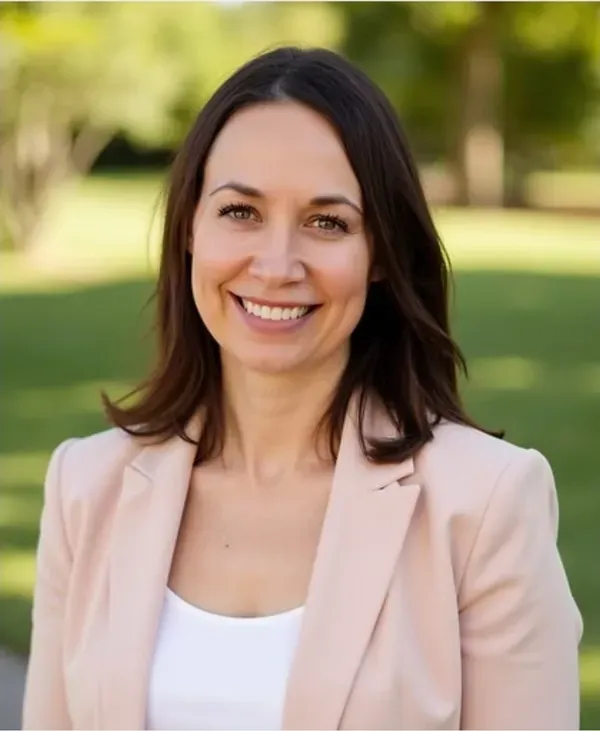
Penelope (Penny) Waller Ulmer
She/HerMACP, BA
Registered Psychologist
Registered Psychologist
 English
EnglishWelcome, I'm glad you're here. This space is held with care and respect for your experience, past and present. I support adults navigating anxiety, attachment, neglect, PTSD, trauma, emotional overwhelm, grief and loss, self-worth, boundaries, people pleasing, caregiving stress (including PLwD), and reproductive and perinatal mental health. My approach is relational and somatic, honouring the body’s role in healing. Whether this is a first step or a return to yourself, I invite you to connect.
Background
I began my career at the Lois Hole Hospital, in perinatal mental health, including birth trauma, fertility challenges, and infant loss. I later worked in public health at a Primary Care Network, offering individual and group therapy for adults navigating anxiety, complex trauma, emotional regulation, and life transitions, often rooted in early relationship dynamics or family of origin experiences. In private practice, I continue integrating evidence-based or informed approaches respecting each person’s pace and lived experience, and drawing from somatic, cognitive-behavioral and psychodynamic approaches, attachment-based therapy, polyvagal, & parts work. Let's explore change, together.
Your therapeutic experience with me
Sessions are collaborative and paced with care. I use both talk therapy and somatic, body-based approaches to explore how past experiences shape current patterns. We track the body’s implicit story through sensation, emotion, posture, breath, and movement to support nervous system regulation, trauma processing, and emotional integration. Modalities may include Sensorimotor Psychotherapy, mindful movement, parts work, and somatic voice work. Clients often experience subtle or profound shifts such as a softening in the shoulders, a clearer boundary, or the release of a long-held belief. These shifts are reinforced through somatic awareness and savouring, which help embed coherence, presence,
Areas of expertise
These are the areas I commonly work with, and they form a big part of the support I offer in my practice:






I also support you in these additional areas and welcome you to reach out if any of them speak to what you are going through:
Therapeutic approaches
These are the approaches at the heart of my work, and I use them often because they help create meaningful change:

Sensorimotor Psychotherapy/body-centered Approach
Sensorimotor Psychotherapy is a somatic, body-based approach for trauma, anxiety, and attachment wounds. It supports nervous system regulation and body awareness, helps complete interrupted actions, addresses unmet needs, and fosters emotional processing and lasting transformation.

Accelerated Resolution Therapy
Accelerated Resolution Therapy (ART) is an evidence-based approach that uses eye movements and image rescripting to reduce distress from trauma, anxiety, or negative memories. It helps the brain reconsolidate stuck images and supports emotional healing and nervous system relief.

Cognitive Behavioural Therapy (CBT)
Cognitive Behavioural Therapy (CBT) helps clients shift negative thought patterns and reduce distress. Third-wave CBT, including ACT and Schema Therapy, supports emotional healing, values-based action, and insight into patterns shaped by early relationships.

Client-centered / Rogerian Therapy
Client-Centered Therapy is a humanistic approach that emphasizes empathy, acceptance, and the client’s capacity for growth. It fosters emotional safety, improves clarity and self-understanding, and is especially supportive for relational wounds and trauma, self-doubt, boundary work, & change making.
I also draw on other evidence based approaches that can gently support you when they align with what you need:

Attachment Focused Therapy

Mindfulness

Eye Movement Desensitization and Reprocessing Therapy (EMDR)

Acceptance and Commitment Therapy (ACT)

Polyvagal-informed Therapy

Psychodynamic Therapy

Somatic Therapy
Focused populations and cultural backgrounds
These are the communities and cultural backgrounds I focus on, and I bring a sincere commitment to supporting you in a way that feels respectful and genuine:
Populations

Adults

Young Adults

Older Adults

Seniors
Cultural communities

First And Second Generation Immigrants

Indigenous Community

1st And 2nd Generation Immigrant
Professional credentials

Registered Psychologist
- No.5090
College of Alberta Psychologists

Registered Psychologist
- No.3630-20-32-081
Government of Yukon
Educational background

Master of Arts in Counseling Psychology
Yorkville University, Canada

Bachelor of Arts
Focus: Psychology
Concordia University, Canada
Specialized training
SPI Approved Consultant Program
Sensorimotor Psychotherapy Institute
Advanced: Complex Trauma / Dissociation
Sensorimotor Psychotherapy Institute
Level 3: SP Certification Training
Sensorimotor Psychotherapy Institute
Level 2: Emotion, Meaning, Attachment
Sensorimotor Psychotherapy Institute
Level 1: Affect Dysregulation, Survival Defenses
Sensorimotor Psychotherapy Institute
Foundational T.R.I.P.
Relationshipworx - Monique Hoving
Accelerated Resolution Therapy - Basic
IS - ART
EMDR - Foundational
EMDRIA
PAC Consultant
Positive Approach to Care
Indigenous Canada
UAlberta
Yukon First Nations 101 (YFN 101)
Yukon University
Practice locations & services
FAQ
Did you know?

This our late, great, office-companion, Ruby - our once toothless, eyeless, smart and sassy shih-tzu cross.

Such an lovely environment in which to practice embodiment. SP training was offered on the UBC campus over the 6 years in which I trained.

Nature as personal and professional self-care. This year, we stayed home and are sending support to the 2025 Saskatchewan Wildfires Appeal.

My Mom on her 84th Hallowe'en. Our relationship inspired my development of a caregiver-stress course for professionals.

My brother decorated the therapy room with his art & I love his work in the space where we meet. (A few may recognize this piece from an album)
Blog
Here are some articles I’ve created for you. Take a moment to read and share them. I hope you find them meaningful.

When FOMO Means More Than Missing Out

For Clinicians: The Power of Peer Consultation

Sensorimotor Psychotherapy for Attachment and Trauma

Beyond the Story: Pregnancy and Birth Trauma & Sensorimotor Psychotherapy

Series: Longing and Belonging - Connection 3/3

Series: Longing and Belonging - Loneliness 2/3

Series: Longing and Belonging - Nostalgia 1/3

Care for the Caregivers of Persons Living with Dementia

Series: Care for the Caregiver (PLwD) - Meaning (3/3)

Series: Care for the Caregiver (PLwD) - Grief (2/3)

Series: Care for the Caregiver (PLwD) - Ambivalence (1/3)
Immediate crisis support available
If you're experiencing a mental health crisis, help is available right now:
- 🚨 Call 911 for immediate emergency assistance
- 💬 Call or text 988 for mental health crisis support and suicide prevention

